INTEREST GROUPS AND ELECTIONS IN CANADA
This is Volume 2 in a series of studies commissioned as part of the research program of the Royal Commission on Electoral Reform and Party FinancingINTEREST GROUPS AND ELECTIONS IN CANADA
F. Leslie Seidle Editor
Volume 2 of the Research Studies
ROYAL COMMISSION ON ELECTORAL REFORM AND PARTY FINANCING AND CANADA COMMUNICATION GROUP PUBLISHING, SUPPLY AND SERVICES CANADA
DUNDURN PRESS TORONTO AND OXFORD
Minister of Supply and Services Canada, 1991
ISBN 1-55002-098-6
ISSN 1188-2743
Catalogue No. Z1-1989/2-41-2E
Published by Dundurn Press Limited in cooperation with the Royal Commission on Electoral Reform and Party Financing and Canada Communication Group Publishing, Supply and Services Canada.
All rights reserved. No part of this publication may be reproduced, stored in a retrieval system, or transmitted in any form or by any means, electronic, mechanical, photocopying, recording, or otherwise (except brief passages for purposes of review) without the prior written permission of the Minister of Supply and Services.
Canadian Cataloguing in Publication Data
Main entry under title:
Interest groups and elections in Canada
(Research studies ; 2)
Issued also in French under title: Les Groupes dintrt et les lections au Canada.
ISBN 1-55002-098-6
1. Pressure groups Canada. 2. Canada. Parliament Elections.
I. Seidle, F. Leslie. II. Canada. Royal Commission on Electoral Reform and Party Financing. III. Series: Research studies (Canada. Royal Commission on Electoral Reform and Party Financing) ; 2.
JL193.I58 1991 | 324.40971 | C91-090514-2 |
Dundurn Press Limited | Dundurn Distribution |
2181 Queen Street East | 73 Lime Walk |
Suite 301 | Headington |
Toronto, Canada | Oxford, England |
M4E 1E5 | 0X3 7AD |
CONTENTS
JANET HIEBERT
A. BRIAN TANGUAY AND BARRY J. KAY
FIGURES
TABLES
FOREWORD
The Royal Commission on Electoral Reform and Party Financing was established in November 1989. Our mandate was to inquire into and report on the appropriate principles and process that should govern the election of members of the House of Commons and the financing of political parties and candidates campaigns. To conduct such a comprehensive examination of Canadas electoral system, we held extensive public consultations and developed a research program designed to ensure that our recommendations would be guided by an independent foundation of empirical inquiry and analysis.
The Commissions in-depth review of the electoral system was the first of its kind in Canadas history of electoral democracy. It was dictated largely by the major constitutional, social and technological changes of the past several decades, which have transformed Canadian society, and their concomitant influence on Canadians expectations of the political process itself. In particular, the adoption in 1982 of the Canadian Charter of Rights and Freedoms has heightened Canadians awareness of their democratic and political rights and of the way they are served by the electoral system.
The importance of electoral reform cannot be overemphasized. As the Commissions work proceeded, Canadians became increasingly preoccupied with constitutional issues that have the potential to change the nature of Confederation. No matter what their beliefs or political allegiances in this continuing debate, Canadians agree that constitutional change must be achieved in the context of fair and democratic processes. We cannot complacently assume that our current electoral process will always meet this standard or that it leaves no room for improvement. Parliament and the national government must be seen as legitimate; electoral reform can both enhance the stature of national political institutions and reinforce their ability to define the future of our country in ways that command Canadians respect and confidence and promote the national interest.
In carrying out our mandate, we remained mindful of the importance of protecting our democratic heritage, while at the same time balancing it against the emerging values that are injecting a new dynamic into the electoral system. If our system is to reflect the realities of Canadian political life, then reform requires more than mere tinkering with electoral laws and practices.
Our broad mandate challenged us to explore a full range of options. We commissioned more than 100 research studies, to be published in a 23-volume collection. In the belief that our electoral laws must measure up to the very best contemporary practice, we examined election-related laws and processes in all of our provinces and territories and studied comparable legislation and processes in established democracies around the world. This unprecedented array of empirical study and expert opinion made a vital contribution to our deliberations. We made every effort to ensure that the research was both intellectually rigorous and of practical value. All studies were subjected to peer review, and many of the authors discussed their preliminary findings with members of the political and academic communities at national symposiums on major aspects of the electoral system.
The Commission placed the research program under the able and inspired direction of Dr. Peter Aucoin, Professor of Political Science and Public Administration at Dalhousie University. We are confident that the efforts of Dr. Aucoin, together with those of the research coordinators and scholars whose work appears in this and other volumes, will continue to be of value to historians, political scientists, parliamentarians and policy makers, as well as to thoughtful Canadians and the international community.
Along with the other Commissioners, I extend my sincere gratitude to the entire Commission staff for their dedication and commitment. I also wish to thank the many people who participated in our symposiums for their valuable contributions, as well as the members of the research and practitioners advisory groups whose counsel significantly aided our undertaking.
Pierre Lortie
Chairman
INTRODUCTION
The Royal Commissions research program constituted a comprehensive and detailed examination of the Canadian electoral process. The scope of the research, undertaken to assist Commissioners in their deliberations, was dictated by the broad mandate given to the Commission.
The objective of the research program was to provide Commissioners with a full account of the factors that have shaped our electoral democracy. This dictated, first and foremost, a focus on federal electoral law, but our inquiries also extended to the Canadian constitution, including the institutions of parliamentary government, the practices of political parties, the mass media and nonpartisan political organizations, as well as the decision-making role of the courts with respect to the constitutional rights of citizens. Throughout, our research sought to introduce a historical perspective in order to place the contemporary experience within the Canadian political tradition.







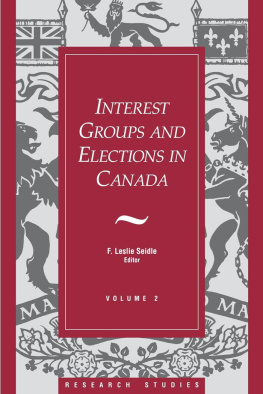
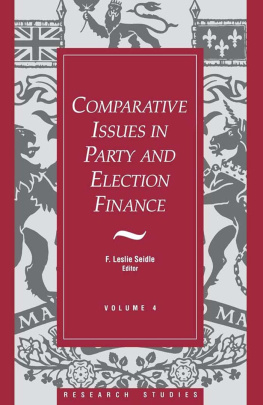

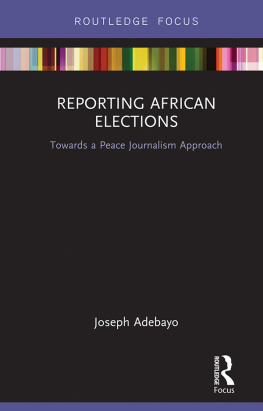
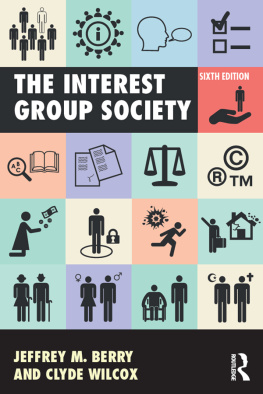
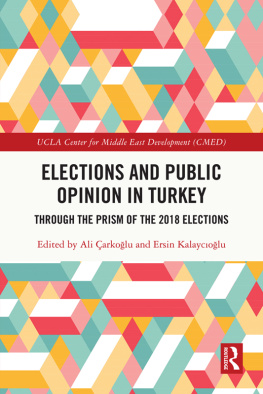
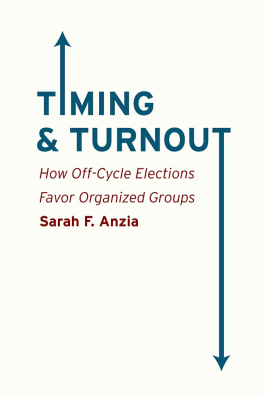
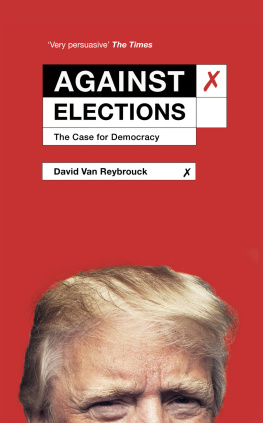
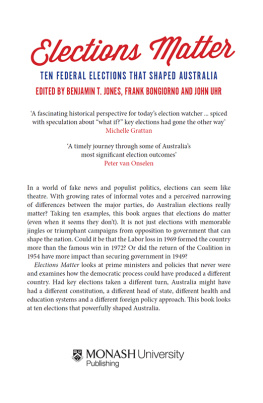
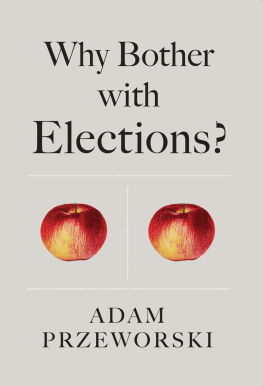

![Scott Leslie - 100 Under 100: The Race to Save the Worlds Rarest Living Things [Paperback]](/uploads/posts/book/54952/thumbs/scott-leslie-100-under-100-the-race-to-save-the.jpg)
